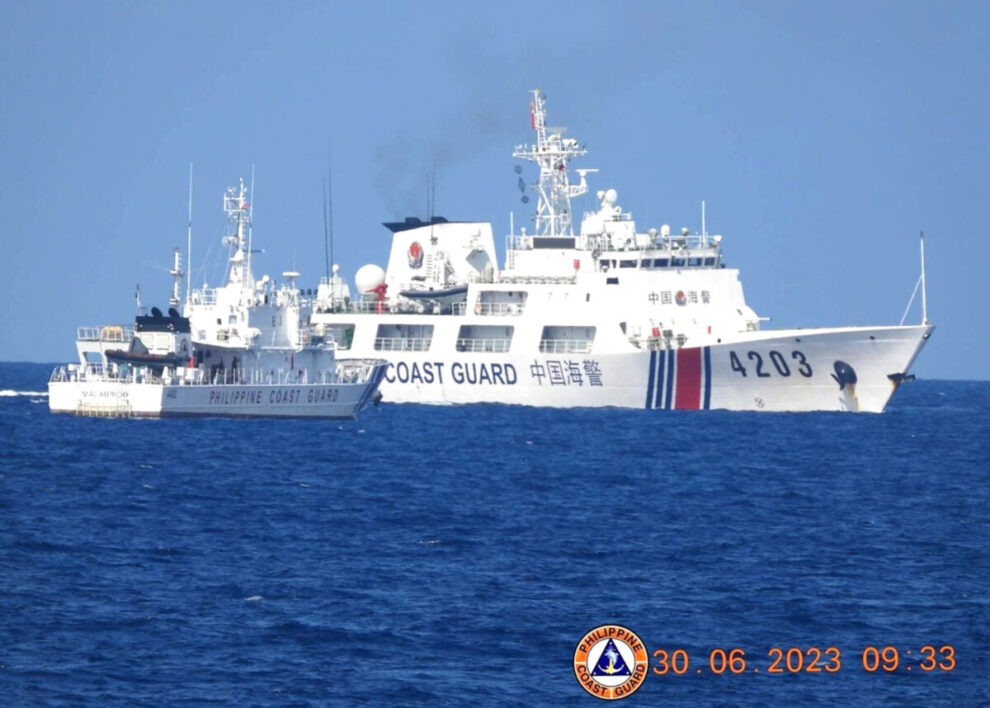A CHINESE foreign ministry official believes that Beijing and Manila can resolve their maritime dispute on their own, but a “third party” could turn the South China Sea (SCS) into a “sea of war.”
Counselor Zhou Li of the Ministry of Foreign Affairs (MoFA) information department underscored the volatile situation in the South China Sea in her tweet Sunday. Zhou did not identify the third party.
Zhou said China and the Philippines agree that negotiation “is the only way to resolve disputes” in the vast waterway.
China, Brunei, Malaysia, Taiwan, Vietnam and the Philippines have overlapping claims in the South China Sea, believed to be rich in gas and oil deposits.
“We have [the] ability to handle it well but have to stay high-alert that South China Sea might be turned into the sea of war by the third party,” Zhou said.
In the past, Beijing has accused the United States of interfering in what has always been a regional concern.
The US, on the other hand, has warned against China’s aggressiveness in asserting its claims in the South China Sea.
Zhou said China’s “goal” is for the South China Sea “to become the sea of peace, friendship and cooperation.”
“We are confident about this. China has always resolved its disputes through negotiations,” the official said.
The Philippine Coast Guard (PCG) recently said Chinese patrol vessels blocked two of its boats from entering Ayungin Shoal in the West Philippine Sea (WPS), describing their action as “very dangerous.”
National Task Force for the West Philippine Sea spokesman Commodore Jay Tarriela said the June 30 incident involved the PCG ships BRP Malabrigo and BRP Malapascua, which were escorting two supply ships to Ayungin.
Zhou noted that since the formulation of the United Nations Convention on the Law of the Sea (Unclos) in 1982, China and countries ringing the South China Sea have “set up bilateral channels of communication to address the disputes.”
On Monday, the French Embassy in the Philippines called for “respect for international law and the resolution of disputes through dialogue.”
“We are resolutely opposed to any use of force or threat to do so. We recall, in this regard, the arbitration award rendered under Unclos on the 12th of July 2016,” the embassy said in a statement.
China, Zhou said, negotiated with Vietnam the agreement on maritime delimitation in the Beibu Gulf and the pact on the management of fishing activities in the same area in 2000.
“And in 2011, we also signed an agreement on guiding principles for the settlement of maritime issues,” she said.
China and the Philippines have maintained communication on fishing and confidence-building measures since 1996, Zhou said.
During the administration of President Gloria Macapagal Arroyo, the Philippines and China cooperated on joint marine seismic projects in disputed areas, she said.
“It’s a pity that the cooperation was stalled later,” Zhou said. “We all understand the complexity of the relevant disputes and know that they cannot be addressed within a short period of time.”
She said China “was the earliest to propose the concept of joint development while shelving disputes and differences.”
The official said it was to the Philippines that China “made the proposal for the first time.”
“Both experiences and lessons should be learned. China and the Philippines are both at the critical period of development,” Zhou said.
“Our policy has remained unchanged, and cooperation only stopped when [then President Benigno] Aquino 3rd initiated the arbitration,” Zhou said.
In January 2013, the Aquino 3rd administration challenged before the Permanent Court of Arbitration (PCA) in The Hague China’s nine-dash line policy in the South China Sea, saying it encroached on the Philippines’ exclusive economic zone (EEZ).
On July 12, 2016, the court issued a landmark ruling that rejected China’s claims and upheld the Philippines’ challenge.
Source: manilatimes










